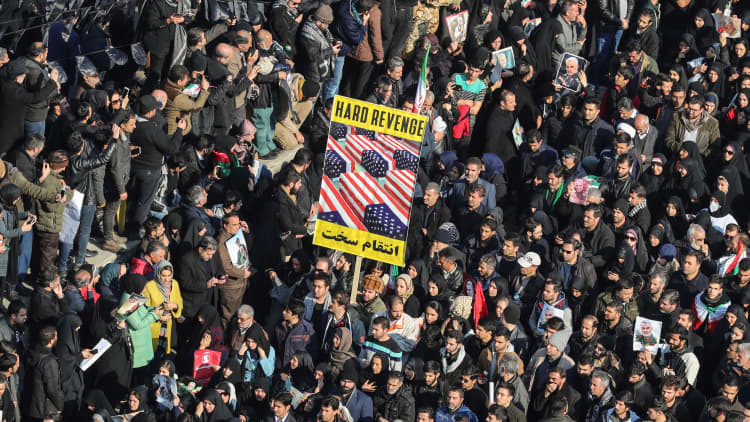
Tensions between the U.S. and Iran continue to worry Wall Street.
Four experts explain how to play the market amid rising geopolitical concerns.
Paul Hickey, co-founder of Bespoke Investment Group, says it's not time to panic yet.
"The Middle East has been a tinderbox and especially over the last three years. We've seen multiple headlines over the last several years where we're being told that we're on the brink of war. It was with North Korea two years ago, and that didn't materialize, and if you panicked about the headlines then, you would have missed out on a lot. So I think you have to put these headlines [into perspective]. Could something really flare up and get bad here? Possibly, but that's been the case forever and it hasn't materialized. So, I think using that as your base case isn't probably the way to go here."
David Albrycht of Newfleet Asset Management has shifted his portfolio strategy.
"Last year we de-risked the portfolios based on relative value. The trade and leveraged finance was up in quality so double Bs in high yield, double Bs in leveraged finance. … We've reallocated and diversified away from corporate risks to go into areas which will really be less sensitive to geopolitical risks, like asset-backed securities and jumbo mortgages, which are backed by the consumer."
Alli McCartney, managing director at UBS Private Wealth Management, says markets will eventually refocus on the fundamentals.
"We do view this as a bump in the road and a flare-up where the base case is that we get back to what we've been focusing on: earnings, accommodative Fed and where phase one ends up. And I think we'll see that in a couple of days. You have a typical reaction from safe-haven assets, especially in a time where there's not a particular opportunity cost."
Diana Amoa, senior fixed income manager at J.P. Morgan Asset Management, says markets are in wait-and-see mode.
"The reaction in equity markets so far has been fairly muted, but that's reasonable given we don't know what's going to come next. I think for us to determine whether Treasuries keep rallying, we need to see what the response is going to be from Iran. We haven't seen that yet. Markets actually have been here in the past, [such as] the situation with North Korea, which at some point looked like we were about to go off the cliff and yet both sides managed to rein us back from actually going into full escalation."





